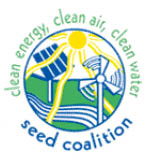Texans Say No to Importing Radioactive Waste From Around the Country; Comments Accepted Until Dec. 26th
December 10, 2010
Media Release – For Immediate Release
Download this press release in pdf format for printing.

Contacts: Karen Hadden, Executive Director, SEED Coalition, 512-797-8481
Tom "Smitty" Smith, Director of Public Citizen’s Texas office, 512-637-9455
Austin, TX The only hearing on a proposed radioactive waste rule that would open Texas up to becoming the nation’s radioactive waste dumping ground was held yesterday in Austin. The rule would let waste from around the country go to Waste Control Specialists’ Andrews County site in West Texas instead of limiting waste to the Compact states of Texas and Vermont.
The Import Rule 30-day public comment period ends Dec. 26th so comments can still be sent to rule.comment@tllrwdcc.org.
A videotape of the Dec. 9th hearing will be online at http://www.texasadmin.com/tceqs.shtml and more information is available at www.NukeFreeTexas.org.
Speakers requested:
- a comment period extension
- that the vote be postponed until the legislature can examine Texas’ financial risks and ability to respond to accidents or contamination.
- that hearings be held in all major Texas cities since radioactive waste could travel down highways throughout the state and
- that Compact Commissioners to vote no to bringing in more radioactive waste.
"Many people are concerned that more radioactive waste means increased financial, health, environmental and security risks," said SEED Coalition Director Karen Hadden “They spoke of broken promises, environmental justice, protecting the land they love and preventing radioactive contamination of water. Some questioned whether anything prevents contamination of the Ogallala Aquifer that lies beneath eight states in the breadbasket region of the nation.”
Speakers included Craig Adair from Rep. Lon Burnam’s office, who brought a letter signed by fifteen House members. Farmers, ranchers, academics, scientists, artists, environmentalists and health advocates participated, coming from as far away as Dallas and Houston. One woman spoke on behalf of farming families in West Texas. Participants represented the League of Women Voters of Texas, NAACP, Texans for Public Justice, Environment Texas, Austin Center for Peace and Justice, SEED Coalition, Public Citizen, Lone Star Sierra Club, and Save Our Springs.
Nuclear reactor vessels, "poison curtains" that absorb reactor core radioactivity, and radioactive sludges and resins could all be sent to the West Texas site. No radionuclide would be excluded. Exposure to radioactive materials can cause cancer, birth defects, reduced immunity and even death, depending on the type of radioactive material and the level of exposure.
###


